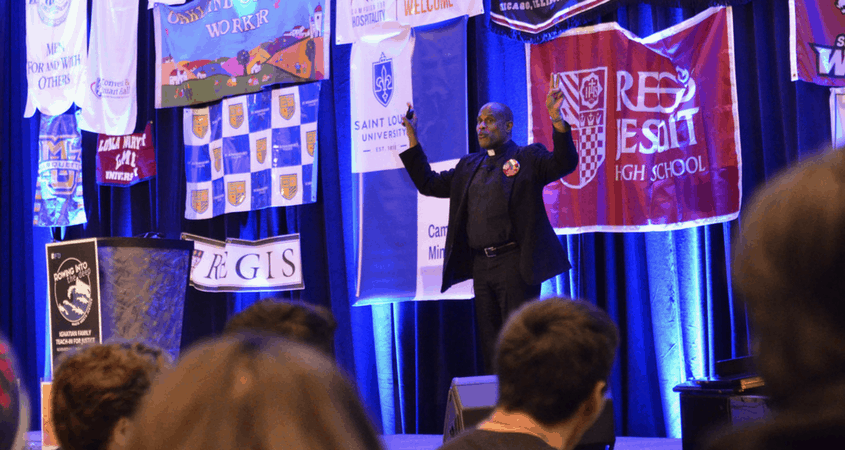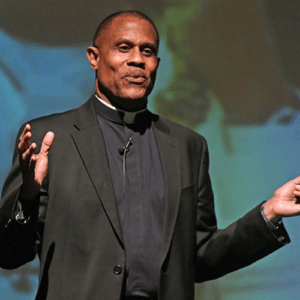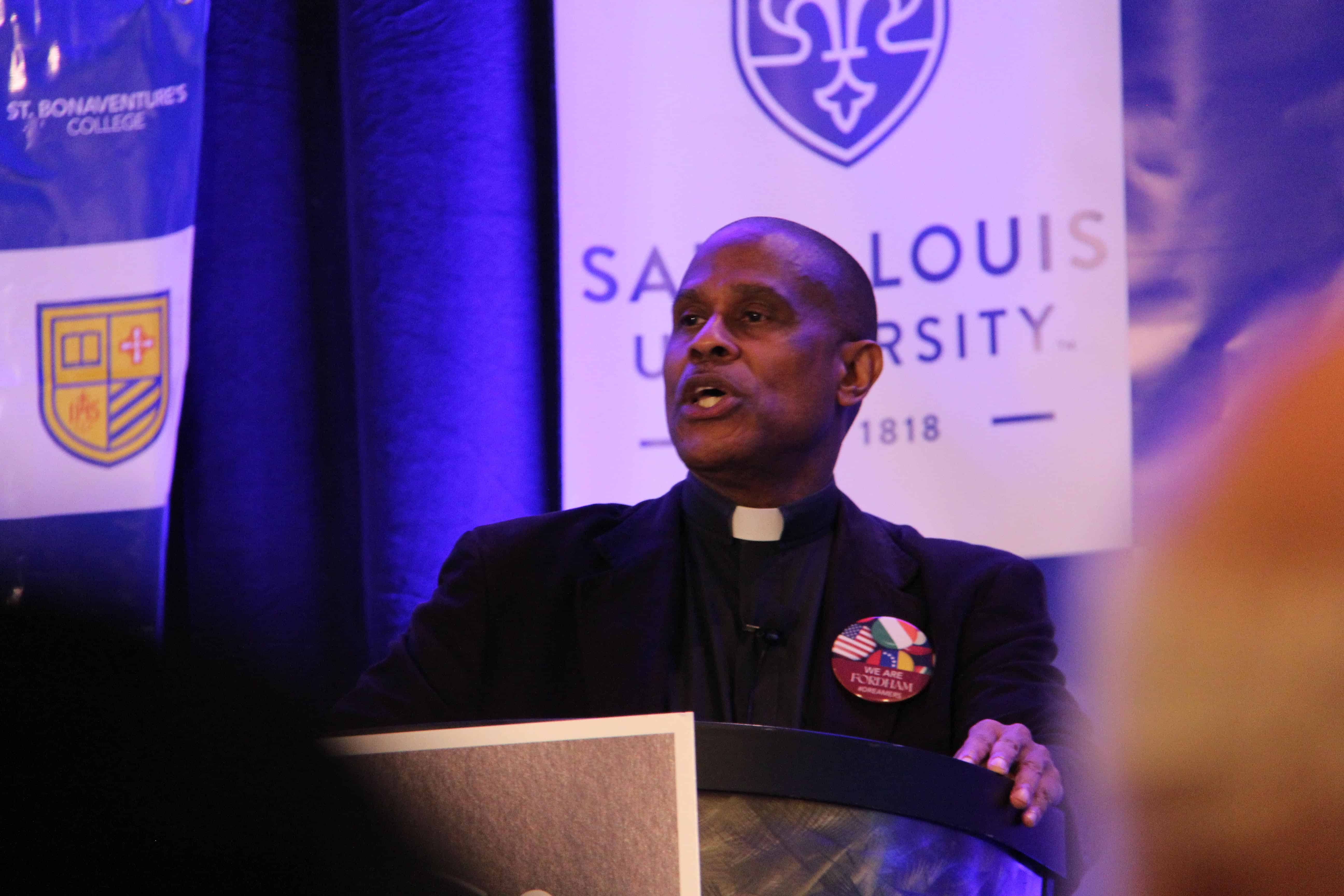This past weekend Bill McCormick, SJ, sat down with Father Bryan Massingale, professor of theology at Fordham University and priest of the Archdiocese of Milwaukee, at the 20th Ignatian Family Teach-In for Justice, where he gave a soaring keynote address on race and America.
Father Massingale, is this your first teach-in?
It is my first teach-in. It’s been fantastic… The energy, the commitment, and the insight of the young people has been truly edifying. It gives me a shot in the arm. It’s been a very hopeful experience.
It’s like a pep rally for faith and justice. That’s an amazing experience. It really is, and that the students were listening intently, I noticed during the keynote. Many of them had traveled during the day to be here, but yet they wanted to be there and they were extremely attentive. It was really awesome to be a part of that experience and to grow from their excitement and their enthusiasm and their commitment. This is one of the most hopeful events in the Catholic church.
I think that there’s a narrative in the Catholic church right now that because of the shrinking number of religious and we’re closing parishes… Basically, we’re in an institutional narrative of consolidation. You can get depressed when you think we’re in a contraction mode. But when you’re in an atmosphere like this, you realize there is a vitality and enthusiasm, which transcends the kind of institutional narrative contraction. You see there are people who are really on fire and who really want to make a difference and make a difference because of what they’re learning in Ignatian institutions. That’s a very hopeful thing to be a part of.
That’s very hopeful and it’s a little surprising because the narrative about so many young Catholics today, particular millennials in general, is that they’re not interested in religion and they’re nones. Maybe they’re spiritually, but they’re certainly not religious.
I think part of it is that we haven’t found a way to make traditional language of faith compelling to them or show them how it illumines their own life experience. I think part of our problem is to find ways to show how language like the common good or solidarity with the poor, or even the communion of saints, how that makes sense out of their life experience. One of the images I used in my talk yesterday was the image of a relay race. That we’re in this relay race for justice, that I will probably never get across the finish line but that’s not my role in the race. My role in the race is to run my leg of it and to do what I can so I can pass the baton to those who will come after me.
It’s not up to me necessarily to cross the finish line, but if I don’t run my race as well as I can, then those who come after me can’t do what they need to do. Something that people can really bear mind to.
I think the challenge for us going forward is to have a more intentional dialogue with the human experience of the millennials or however we want to call that, call that generation, and our faith, and to show how they can mutually inform each other. I think part of our problem is that we’ve not presented our faith in ways that are compelling enough. We present it more of an abstract doctrines rather than it’s living ideas that have a real impact in people’s lives.

Photo courtesy Ignatian Solidarity Network.
Do you see a special role, since this is the Ignatian family, for Ignatian spirituality and its distinctive lexicon in the project to make faith more compelling?
I’m trying to wean people away from cura personalis and being “men for others.” I still believe in them deeply. But I think they’ve become kind of shock-worn. They’ve become almost too familiar.
Whereas magis, I mean, first it’s in Latin, so of course it’s going to be a little more mysterious. But the magis is that, from how I understand it, it’s that inner longing, that restlessness for that which is always out of our reach, but that which beckons us and allures us, and entices us to reach beyond where we are now.
It’s that inner dynamism of spirit that leaves us dissatisfied with the way things are and always calls us forward into the deep. Into the beyond. Into the realm of mystery that we never stop understanding. That we can never fully comprehend. And when we talk like that, students don’t always get what you’re talking about, but because they can’t get what you’re talking about they’re fascinated and want to know more. Because I think that there’s an inner hunger for more. There’s an inner hunger that the way the world is right now is not the way it ought to be and as I quote Albert Einstein last night; if we’re going to change our society, we have to change the way we think. We have to change the way we live. We need more than just a new strategic plan.
It’s probably the most subversive concept in the Jesuit lexicon because you can never fully put your arms around it because it’s always going to take you to someplace new. Someplace different. Because it’s going to demand that your heart becomes broken so you’re open to that which is beyond you.
The magis to me is what the Ignatian 30 day retreat is all about. And I think especially when we’re looking at issues of racial justice or ecological justice. We’ve got to be drawn beyond where we are. And that’s where I think the Magis, the more we can think more about that term… I’ll just say it’s full of pregnant possibilities that we haven’t begun to fathom yet.

Photo courtesy Ignatian Solidarity Network.
This is one of the most moving descriptions of the Magis I’ve heard.
The great joy of my ministry as a professor of theology at Fordham is to try to create within students those who will do what I’m doing and more. I don’t want them to do what I’m doing. I want them to be equipped to do what they’re going to do. And hopefully they’ll build on what I’m doing and take what I’m doing in directions I can’t even imagine. That’s the Magis.
I think unless we become more intentional about recapturing the inner dynamism of that word it can become denigrated to be a synonym for the American understanding of Magis, which means, “bigger, better, and improved.”
Stay tuned for Part II of TJP‘s interview with Fr Massingale!


